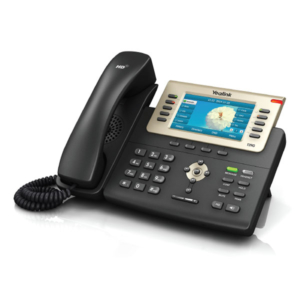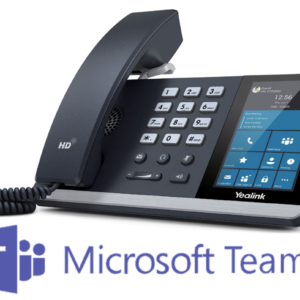VoIP Phones
Voice over Internet Protocol – VoIP – is a new way to make and receive telephone calls using a broadband Internet connection rather than a regular phone line. A VoIP service may offer unlimited local and long distance calls for a fixed price, as well as features like integrated calls and email, and access to your phone line from many locations.
Keep in mind:
VoIP: It‘s A Phone, It’s a Computer, It’s…
Voice over Internet Protocol – VoIP – is one way people are making and receiving telephone calls using a broadband Internet connection rather than a regular phone line. VoIP converts your phone call – actually, the voice signal from your phone – into a digital signal that travels through the Internet to the person you are calling. If you are calling a plain old telephone number, the signal is converted back at the other end. If you’re comfortable with new technology, you may want to learn more about VoIP. OnGuard Online suggests that it’s smart to do some research on this technology before signing up for it.
VoIP technology is offered by some companies that specialize in VoIP service, some traditional telephone and cable companies, as well as some Internet Service Providers. Most services using VoIP allow you to call anyone with a telephone number – including local, long distance, cellular, and international numbers. Others may allow you to call only people with the same service. In addition, most VoIP services allow you to use a traditional telephone through an adaptor, but others work only over your computer or a special VoIP phone.
If you get VoIP service that allows you to make a call using a phone with an adaptor, you dial the same way you always have. If you get a VoIP service that works directly from your computer, you need to use special software, a microphone, speakers, and a sound card. If your service assigns you a regular phone number, anyone can call you from a regular phone – analog or digital – without any special equipment.
VoIP Services
Many VoIP services include unlimited local and long distance calling plans for a fixed price, plus a range of interesting features, like:
- the ability to have more than one phone number, including phone numbers with different area codes.
- integrated voicemail and email message systems so you can listen to your voicemail on your computer or your email on your phone.
- with special software and hardware, the ability to take your VoIP system with you if you travel with your computer. That means personal or business calls can be routed to you no matter where you are.
Caveats
Any decision to sign up for a VoIP service should be based on careful consideration of the facts, and your comfort level with technology. Investigate the companies you are considering for your service. Many Internet search engines can lead you to a wealth of information about consumer experiences with particular providers.
Among the issues to think about are:
Terms and Conditions: Ask about the costs, terms, and conditions of service. Many VoIP providers offer monthly calling plans: make sure you know the number and type of calls included in the amount you’ll be billed. VoIP plans generally look inexpensive compared to regular telephone plans, but don’t forget the cost of broadband Internet access. For most people, that will mean paying separately for cable modem service or digital subscriber line (DSL) service.
Limits of Service
Phone Number
Many VoIP companies can arrange for your current phone number to be switched to your VoIP service, but that could take time; in the interim, you will have a new phone number.
Directory Assistance
VoIP services don’t have the same access to directory assistance services as traditional telephone service does. Your telephone number probably won’t be included in directory service listings provided by the local telephone company.
Power or Service Outages
Consider backup phone service for power or service outages.
Equipment and Installation
Installing VoIP service is not as simple as plugging in a telephone. You may have to connect equipment and adjust to a new system. Note that there are different ways to use the technology: An analog gateway works on your regular phone to enable VoIP calls. Or you can use special Internet telephones, known as IP phones, that look like traditional phones but have all the software and hardware necessary to connect directly to your computer’s router to make or receive calls. If you use VoIP to make computer-to-computer calls, you’ll need special software, a microphone, a sound card, and speakers. If you’re using VoIP and a phone adaptor to make calls, your computer doesn’t have to be turned on as long as your broadband Internet connection is working.
Security
VoIP calls are transmitted over the Internet, which raises security risks that are not an issue with regular telephone service. For example, VoIP services can be attacked by computer viruses or worms; you can be subject to SPIT (Spam over Internet Telephony), a new kind of spam, and left with mass voice mail messages in your inbox; and you can be caught in a denial of service attack.
Compare VoIP Phones
Now that you better understand both how VoIP phones work and what they can do to improve your business communications, it’s time to select a phone model.
This can often become a daunting task when you realize that there are hundreds of devices to choose from and more than a dozen brands.
Primary questions your organization should consider before choosing a device:
Look at the brands.
Are there names you trust more than others? Think about service too. Do they have a convenient and reputable service arrangement?
- Yealink has been well known by customers and enjoys a worldwide fame. As the navigator of IP communication industry, Yealink focuses on design and manufacture of IP phones with low carbon and high quality to provide excellent and efficient technical supports, helping clients from all over the world to their business success.
- Poly is the global leader when it comes to productive and effective engagement with colleagues, partners, customers, and prospects. You can’t look at a serious VoIP solution without including their product line in your decision-making process.
- Cisco is the big name in business networks and internet infrastructure and another lead player in the VoIP hardware realm.
Now look at the first row labeled – Line Appearances.
How many lines does each device in your business need to be able to handle?
Do you or your receptionist already use headsets?
What type of connector does he or she have? An RJ-9 is a small telephone type while phones with USB ports will also support USB headsets. If you need Bluetooth, then make sure your device supports it.
Is PoE important to you?
Then make sure the device you pick has that capability.
Don’t forget about future needs.
Try to predict what you will need in a year or even five years. Is this device going to be able to handle healthy, realistic growth? Whatever you choose, be comforted by the fact that VoIP is more scalable and flexible than any phone system of the past.
How Do I Know My Organisation is Getting a Business Grade VoIP Service/Package?
There are a few critical elements to look at when considering whether the VoIP service you are looking at is of a quality high enough to be considered for your business, these include:
- Does the VoIP service provider use a secure APN if it is wireless? An APN is defined as an “Access Point Name” and is the connection verifier ensuring that the your connection to our Tier One voice network is secure and stable at all times.
- Is the VoIP network you are connecting to Tier One? Tier One networks are those networks that connect directly to the core South African mobile telecommunications suppliers including Telkom, Vodacom, MTN and Neotel, now Liquid Telecoms. Wikipedia defines a Tier One Network as – an Internet Protocol (IP) network that can reach every other network on the Internet solely via settlement-free interconnection. This is important because you do not want to be routing your voice traffic through multiple tiers.
Request details on other sites or review the VoIP service providers’ online reviews to ensure you are dealing with a stable, competent VoIP service provider that understands business VoIP systems.
Enhance your phone security with VoIP Hybrid Gateways
Q-KON SA’s selection of VoIP gateways and SBC’s (Synway) gives users plenty of options. Providing the best service that’s technologically available, connecting your system through a VoIP gateway will make it easy to get into the system, share documents, and maintain a quality internet connection that keeps your company running.
























